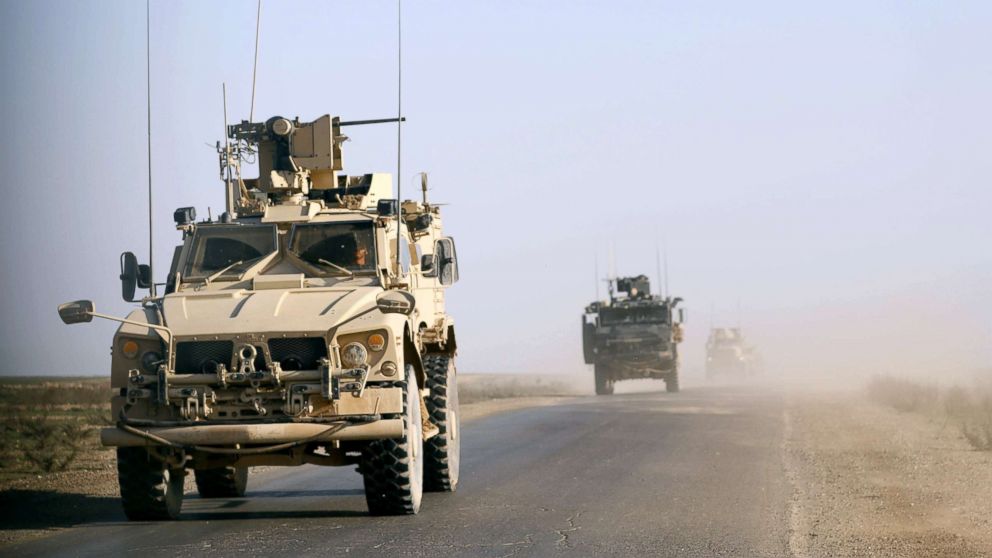'Roughly 400' US troops to remain in Syria as observers in 'safe zone'
President Donald Trump on Friday denied he was "reversing course" on his order that all 2,000 U.S. troops be withdrawn from Syria despite an unexpected White House announcement Thursday night that hundreds would remain as a "peacekeeping force."
"Roughly 400" American troops will stay on in Syria, a senior administration official said Friday.
"A small U.S. presence will remain in northeast Syria as part of a multinational monitoring and observer force," the official said.
The sudden adjustment to what Trump had said would be the total withdrawal of U.S. forces is intended, the official said, to maintain stability in Syria and prevent a resurgence of ISIS after the majority of the U.S. troops leave.
Initial plans call for the U.S. troops to participate in a force of "up to 1,500" from other partner nations.
"Separately, the U.S. will maintain a presence at the Al Tanf Garrison" in southern Syria near the border with Jordan, the official said.
"The goal will be to main stability and prevent an ISIS resurgence," said the official, who added that the multi-national observer mission is intended to create a safe zone in northeastern Syria.
On Thursday night, White House press secretary Sarah Sanders announced that 200 American forces would remain in Syria after a U.S. withdrawal in a "peacekeeping" capacity.
An observer force in northeastern Syria has been proposed as part of a "safe zone" that would ease tensions between Turkey and the U.S.-backed Syrian Kurdish force that is on the verge of defeating the last battlefield remnants of ISIS. The idea of a safe zone in Syria had first been proposed by Turkish President Recep Erdogan.
The administration turnaround came after European allies had a tepid response to the Trump administration's proposal that they fill the security vacuum created by a U.S. withdrawal.
The continued presence of a separate U.S. military force in Al Tanf will serve as a check on Iran's freedom of movement in Syria. Since President Trump's decision to withdraw U.S. troops from Syria, U.S. officials have floated the idea of keeping U.S. troops at the garrison near the Jordanian border to counter Iran's presence in Syria.
Ironically, by keeping 400 American troops in Syria, the Trump administration is close to returning to the Pentagon's long-standing estimate for the number of U.S. troops in Syria. For years, the Pentagon insisted that there were about 500 U.S. troops in Syria, though the actual number was closer to 2,000.
On Thursday, acting Defense Secretary Patrick Shanahan denied that allies had rejected the idea out of concerns that U.S. troops would not participate in the mission.
"Our mission remains unchanged in terms of the defeat of ISIS," Shanahan told Pentagon reporters on Friday. "The transition that we are working towards is stabilization and to enhance the security capability of local security forces. We'll do that as strategic partners."
Gen. Joseph Dunford, chairman of the Joint Chiefs of Staff, expressed confidence on Friday that European allies would join a multinational observer force.
Dunford also explained that a transition towards stabilization efforts had always been planned with a focus on training local security forces.
"So, there's no change in the basic campaign, the resourcing is being adjusted because the threat has been changed," he told Pentagon reporters.
So far, the U.S. military has only removed equipment and supplies from Syria as part of President Trump's withdrawal order. The withdrawal of troops is slated to begin in coming weeks pending further White House guidance.
A U.S. official said that with Trump's new decision to keep some forces in Syria, the U.S. military will now develop a plan to adjust the withdrawal and to resource the new observer mission.
The official added that it was unclear what the total number of U.S. troops might be given that a lot depends on how much force protection might be needed.
GOP Sen. Lindsey Graham of South Carolina hailed Trump's decision when it was announced Thursday night. A close supporter of and adviser on foreign policy, Graham has been strongly critical of Trump's decision to pull out all U.S. forces in Syria.
“I applaud President Trump’s decision to leave a small contingent of American forces in Syria as part of an international stabilizing force," said Graham. "This also ensures Turkey and SDF elements that helped us defeat ISIS will not go into conflict."
Graham said an international safe zone in Syria was also "the best way to achieve our national security objectives of continuing to contain Iran, ensuring the enduring defeat of ISIS, protecting our Turkish allies, and securing the Turkish border with Syria."
“With this decision, President Trump has decided to follow sound military advice," he added. "This decision will ensure that we will not repeat the mistakes of Iraq, in Syria. For a small fraction of the forces we have had in Syria, we can accomplish our national security objectives."




